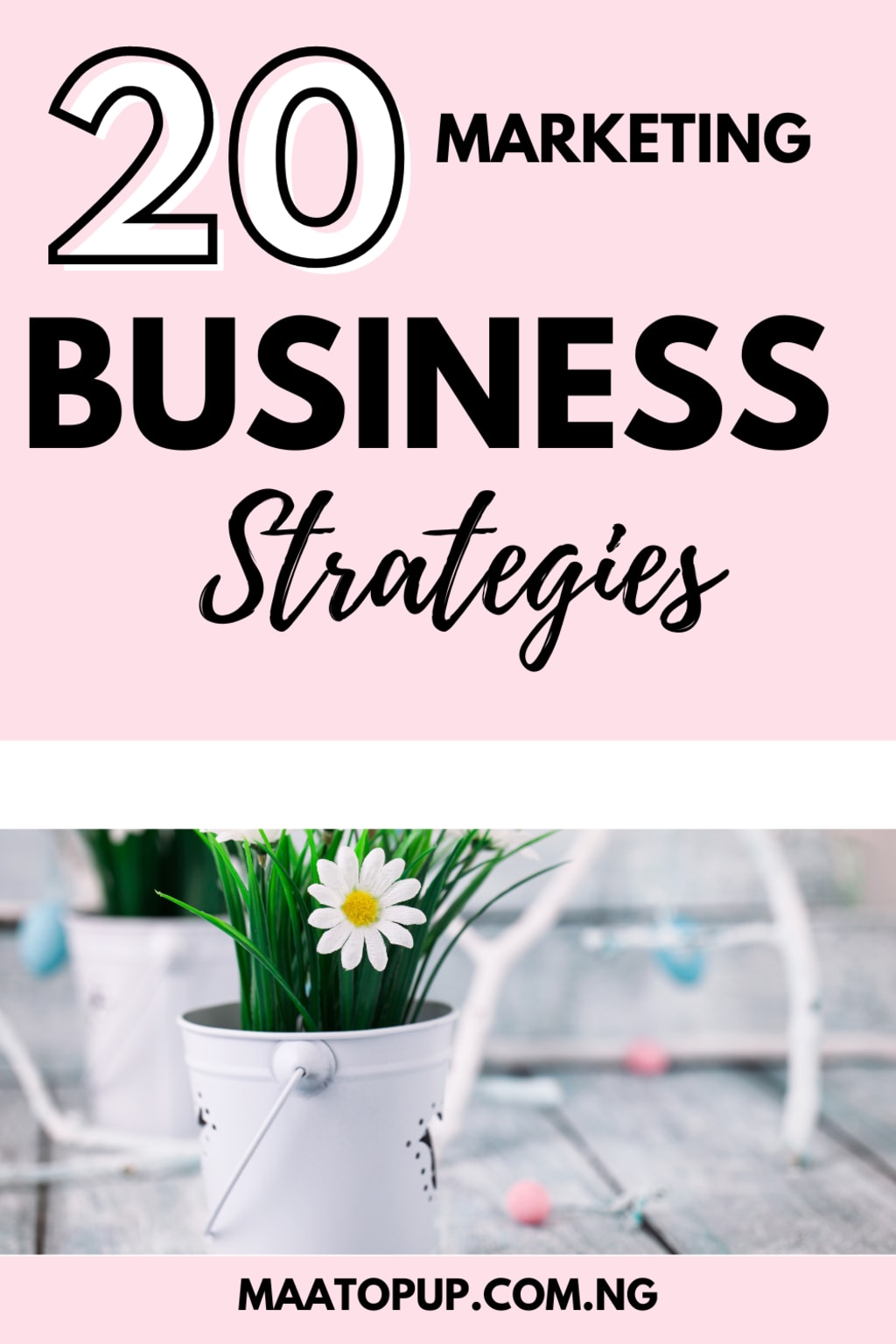20 offline and online business marketing strategies
Marketing strategies

Business refers to the activities involved in producing, buying, selling, or distributing goods or services for profit. It encompasses a wide range of operations, including manufacturing, marketing, finance, management, and more. Businesses aim to meet the needs and demands of customers while generating revenue and maintaining profitability. They can vary in size and structure, from small local enterprises to multinational corporations, and operate in various industries such as technology, healthcare, finance, retail, and hospitality.
Business strategy refers to a set of decisions and actions taken by a company to achieve its long-term goals and objectives. It involves analyzing the internal and external environment, identifying strengths, weaknesses, opportunities, and threats (SWOT analysis), and formulating a plan to leverage strengths, mitigate weaknesses, capitalize on opportunities, and address threats.
Key components of business strategy include:
1. **Mission and Vision**: Defining the purpose and aspirations of the company.
2. **Goals and Objectives**: Setting specific, measurable targets to guide strategic decisions.
3. **Market Analysis**: Understanding the industry, competitors, customers, and market trends.
4. **Competitive Advantage**: Identifying what sets the company apart from competitors and how it can sustain that advantage.
5. **Resource Allocation**: Allocating resources (financial, human, technological) effectively to support strategic initiatives.
6. **Strategic Initiatives**: Developing plans and actions to achieve long-term objectives, which may include expansion, diversification, innovation, partnerships, or acquisitions.
7. **Risk Management**: Assessing and mitigating potential risks that may impact the success of the strategy.
8. **Performance Measurement**: Establishing metrics and KPIs to track progress and evaluate the effectiveness of the strategy.
Business strategy guides decision-making at all levels of the organization and provides a roadmap for allocating resources and pursuing growth opportunities in a competitive market landscape.
10 online marketing strategies for small business owners
Certainly, here are ten online marketing strategies tailored for small business owners:
1. **Create a Professional Website**: Establish an attractive and user-friendly website that showcases your products or services, provides essential information, and includes clear calls-to-action.
2. **Search Engine Optimization (SEO)**: Optimize your website with relevant keywords, meta tags, and high-quality content to improve its visibility in search engine results pages (SERPs) and attract organic traffic.
3. **Content Marketing**: Develop valuable and engaging content such as blog posts, articles, videos, or infographics to educate, entertain, and engage your target audience, positioning your brand as an authority in your industry.
4. **Social Media Marketing**: Utilize popular social media platforms like Facebook, Instagram, Twitter, LinkedIn, or Pinterest to connect with your audience, share content, run targeted ads, and foster relationships with customers.
5. **Email Marketing**: Build an email list of interested prospects and customers and send regular newsletters, promotions, or updates to stay top-of-mind and encourage repeat business.
6. **Pay-Per-Click (PPC) Advertising**: Invest in paid advertising campaigns on platforms like Google Ads or social media channels to target specific demographics, keywords, or interests and drive traffic to your website or landing pages.
7. **Local SEO and Listings**: Optimize your online presence for local search by claiming and updating your Google My Business listing, encouraging customer reviews, and ensuring consistent NAP (Name, Address, Phone Number) information across online directories.
8. **Online Reviews and Reputation Management**: Encourage satisfied customers to leave positive reviews on platforms like Google, Yelp, or Facebook, and promptly address any negative feedback to maintain a positive online reputation.
9. **Affiliate Marketing**: Partner with influencers, bloggers, or other businesses in your industry to promote your products or services in exchange for a commission on sales generated through their referral links.
10. **Analytics and Performance Tracking**: Monitor the effectiveness of your online marketing efforts using tools like Google Analytics or social media insights, and adjust your strategies based on data-driven insights to maximize ROI and achieve your business goals.
Implementing a combination of these strategies can help small business owners effectively market their products or services online and reach their target audience cost-effectively.
Here are ten offline marketing strategies tailored for small business owners:
1. **Networking Events**: Attend industry-specific networking events, conferences, or trade shows to connect with potential customers, partners, and suppliers and promote your business.
2. **Local Sponsorship**: Sponsor local events, sports teams, or community initiatives to increase brand visibility and show support for your community.
3. **Print Advertising**: Place advertisements in local newspapers, magazines, or niche publications that are read by your target audience to reach potential customers in your area.
4. **Direct Mail Campaigns**: Send targeted direct mail pieces such as postcards, flyers, or brochures to households or businesses within your local area to promote special offers, events, or new products.
5. **Distributing Flyers or Brochures**: Distribute printed materials like flyers, brochures, or business cards in high-traffic areas such as shopping centers, local businesses, or community bulletin boards to attract attention and generate leads.
6. **Host Workshops or Seminars**: Organize educational workshops, seminars, or classes related to your industry expertise to showcase your knowledge, build trust with potential customers, and generate leads.
7. **Vehicle Branding**: Use vehicle wraps or decals to brand company vehicles with your logo, contact information, and key messages, turning them into mobile advertisements that promote your business wherever they go.
8. **Local Partnerships**: Form partnerships with complementary local businesses or organizations to cross-promote each other's products or services and expand your reach within the community.
9. **Public Relations (PR)**: Develop relationships with local media outlets such as newspapers, radio stations, or TV channels and pitch newsworthy stories or press releases about your business to gain media coverage and increase brand awareness.
10. **Community Engagement**: Participate in community events, volunteer initiatives, or charity fundraisers to demonstrate your commitment to social responsibility and build goodwill with local residents.
By combining offline marketing strategies with online tactics, small business owners can create a well-rounded marketing approach that effectively reaches and engages their target audience both online and offline.
In conclusion, for small business owners, implementing a comprehensive mix of both online and offline marketing strategies is essential for success in today's competitive landscape. By leveraging digital channels such as websites, social media, and email marketing, businesses can reach a wider audience, engage with customers in real-time, and drive measurable results at a lower cost. Additionally, offline tactics like networking events, local sponsorships, and community engagement provide valuable opportunities to establish personal connections, build brand recognition, and foster trust within the local community.
A well-balanced approach that integrates both online and offline marketing strategies allows small business owners to maximize their reach, optimize their resources, and achieve their business objectives effectively. Moreover, continuously monitoring performance, adapting to market trends, and refining strategies based on data-driven insights are crucial for long-term growth and sustainability in today's dynamic business environment. By staying agile, innovative, and customer-focused, small business owners can position themselves for success and thrive in the ever-evolving marketplace.
About the Creator
MaaTopup
Teacher and entrapreneur
Enjoyed the story? Support the Creator.
Subscribe for free to receive all their stories in your feed. You could also pledge your support or give them a one-off tip, letting them know you appreciate their work.






Comments (1)
Hats off to your nice work. You are a good researcher!